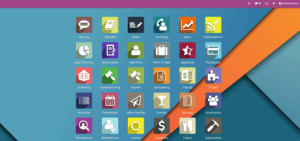Odoo
 | |
 | |
| Original author(s) | Fabien Pinckaers |
|---|---|
| Developer(s) | Odoo S.A. |
| Stable release |
10.0
/ October 5, 2016 |
| Preview release |
current master version
/ daily |
| Repository |
github |
| Written in | Python, JavaScript, XML |
| Operating system | Linux, Unix-like, OS X, Windows |
| Type | ERP, CRM, Accounting, CMS |
| License |
"Community" version: GNU Lesser General Public License v3 "Enterprise" version: Proprietary license |
| Website |
www |
Odoo (formerly known as OpenERP[1] and before that, TinyERP) is a suite of enterprise management applications. Targeting companies of all sizes, the application suite includes billing, accounting, manufacturing, purchasing, warehouse management, and project management.[2]
Community edition is supplemented with an Enterprise edition @ USD 240/- per user per year and a commercially supported online edition. Source code for the OpenObject framework and core ERP (enterprise resource planning) modules is curated by the Belgium-based Odoo S.A. The last fully featured Open Source version was 8.0 (LTS), available on GitHub under AGPLv3.[3] Odoo is the most popular open source ERP system.[4]
Source code model
From inception, Odoo S.A / OpenERP S.A have released software as Open Source but starting at the V9.0 release, the company has transitioned to an open core model which provides subscription-based proprietary Enterprise software and cloud-hosted Software as a service, and a cut-down community version.
Community & network
In 2013, the not-for-profit Odoo Community Association [5] was formed to promote the widespread use of Odoo and to support the collaborative development of Odoo features. This organisation has over 150 members who are a mix of individuals and organisations.
Odoo S.A. are focussing on the SaaS business rather than a service business and recommend integrations and customisations through the partner network. Customized programming, support, and other services, are provided by an active global community and a network of 600 official partners and integrators.
Modules / components
The main Odoo components are the OpenObject[6] framework, about 30 core modules (also called official modules) and more than 3000 community modules.
Educational use
Odoo has been used as a component of university courses.[7] A study on experiential learning suggested that OpenERP[8] provides a suitable alternative to proprietary systems to supplement teaching.
Books & publications
Several books have been written about Odoo,[9] some covering specific areas such as accounting[10] or development.[11]
Awards
Odoo has received awards including Trends Gazelle and BOSSIE Awards[12] four years in a row. [13][14][15][16][17]
Software & architecture
Odoo uses Python scripting and Postgres database. A development repo is on GitHub.
Vendor support
The 3 last LTS version are supported in parallel. This means that when a new LTS version is released, an older version reaches its end-of-life, and is not supported anymore. As an example, 8.0 LTS will be supported along with 9.0 LTS and 10.0 LTS, but will reach end-of-life when 11.0 LTS is released.
Release history
| Program name | Version | Release date | Significant changes | Software license |
|---|---|---|---|---|
| Tiny ERP | 1.0 | February 2005 | First release | GNU GPL |
| 2.0 | May 2005 | GNU GPL | ||
| 3.0 | September 2005 | GNU GPL | ||
| 4.0 | December 2006 | GNU GPL | ||
| OpenERP | 5.0 | April 2009 | GNU GPL | |
| 6.0 | January 2011 | First web client | GNU AGPL[19] | |
| 6.1 | February 2012 | First Ajax web client, discontinued GTK client | GNU AGPL | |
| 7.0 | December 22, 2012 | Improved web client and usability | GNU AGPL | |
| Odoo | 8.0 | September 18, 2014 | Revamped Inventory and WMS, Support for CMS: Website builder, e-commerce, point of sale and business intelligence | GNU AGPL |
| 9.0 | October 1, 2015 | Revamped Accounting features, Odoo Community split from Odoo Enterprise [20] | GNU LGPL v3 | |
| 10.0 | October 5, 2016 | Revamped Manufacturing features | GNU LGPL v3 |
See also
- Comparison of accounting software
- List of free and open source ERP packages
- List of free and open source software packages concerning finance
- Tryton, a fork of TinyERP version 4.2.
References
- ↑ Le Soir BE. "Un entrepreneur wallon lève 10 millions de dollars avec OpenERP". Retrieved July 7, 2015.
- ↑ "10 Open Source ERP Options". Retrieved July 27, 2015.
- ↑ 8.0 on GitHub
- ↑ "ERP Systems - Popularity Ranking Open Source". Retrieved November 26, 2016.
- ↑ Odoo Community Association (OCA) website
- ↑ "Comparative Study of Open ERP and its Technologies" (PDF). International Journal of Computer Applications. 73. July 2013.
- ↑ "http://www.fsa.ulaval.ca/cours/plans/2009H/SIO22915_3476.pdf" (PDF). www.fsa.ulaval.ca. Retrieved June 26, 2015. External link in
|title=(help) - ↑ "http://aisel.aisnet.org/cgi/viewcontent.cgi?article=1093&context=amcis2014". aisel.aisnet.org. Retrieved June 26, 2015. External link in
|title=(help) - ↑ Moss, Gregory (2015). Working with Odoo. Packt. ISBN 978-1784394554.
- ↑ Mader, Greg (2015). Financial Accounting with Odoo: Versions 6, 7, and 8. ISBN 1508737568.
- ↑ Reis, Daniel (2015). Odoo Development Essentials. Packt. ISBN 1784392790.
- ↑ InfoWorld staff (September 17, 2013). "Bossie Awards 2013: The best open source applications". InfoWorld. Retrieved July 27, 2015.
- ↑ staff, InfoWorld. "Bossie Awards 2013: The best open source applications". Retrieved July 7, 2015.
- ↑ Gene Marks (August 11, 2014). "25 Great CRM Applications You Probably Never Heard Of". Forbes. Retrieved July 27, 2015.
- ↑ Jaikumar Vijayan (October 21, 2010). "OpenERP aims to impress U.S. market". Computerworld. Retrieved July 27, 2015.
- ↑ roxannevarza. "OpenERP gets €3 million for US expansion". TechCrunch. AOL. Retrieved July 27, 2015.
- ↑ James Borck, InfoWorld. "Bossie Awards 2016: The best open source applications".
- ↑ https://doc.odoo.com/contribute/14_release_cycle
- ↑ https://github.com/odoo/odoo/blob/6.0/LICENSE
- ↑ https://www.odoo.com/blog/odoo-news-5/post/more-than-ever-odoo-has-it-all-315
External links
| Wikimedia Commons has media related to OpenERP. |